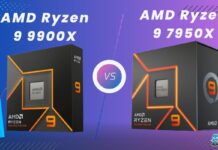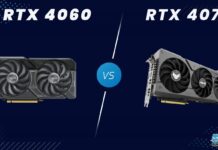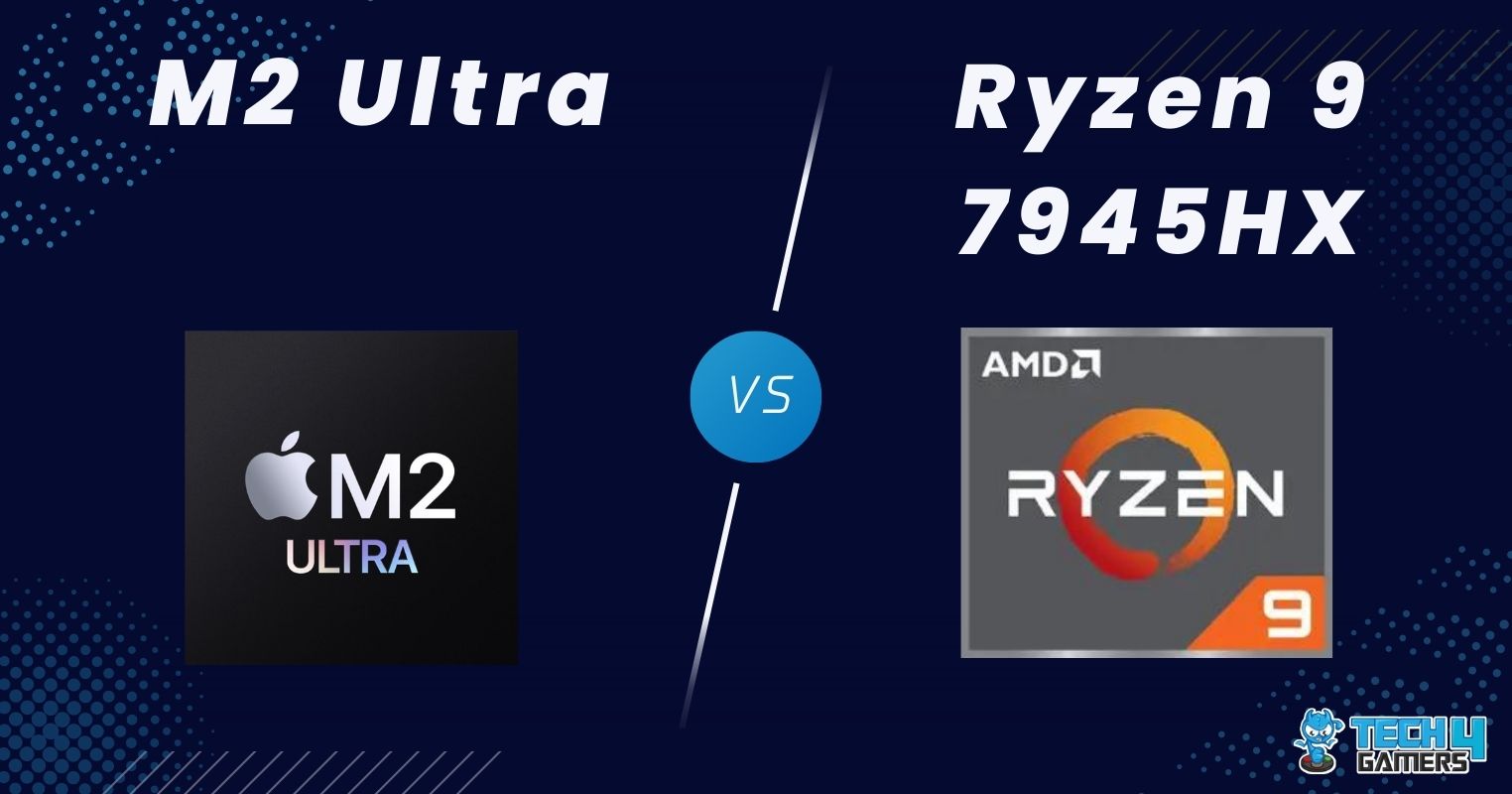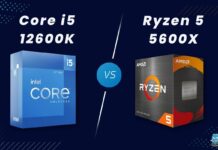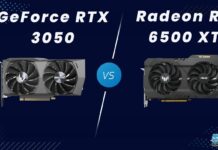The release of the RTX 4060 Ti has been rocky at best, with its low VRAM amount and degraded bus width compared to its predecessor, the RTX 3060 Ti. In the RTX 4060 Ti vs RTX 3060 comparison, we will see if the aforementioned graphics card can hold a candle to the value proposition of the RTX 3060.
Key Takeaways
- The RTX 4060 Ti averaged 140 FPS across the 10 games tested, whereas the RTX 3060 came in with an impressive, yet much lower, average of 94 FPS.
- The RTX 4060 Ti had an average peak power draw of about 140 Watts, whereas the RTX 3060 Ti drew 157 Watts on average.
- The temperature difference between these two cards was within the margin of error.
Comparison Table
| Technical Specs | NVIDIA RTX 3060 | NVIDIA RTX 4060 Ti |
| GPU | GA106 | AD106 |
| Architecture | Ampere | Ada Lovelace |
| Transistors | 12,000 million | 22,900 million |
| CUDA Cores | 3584 | 4352 |
| Tensor Cores | 112 | 136 |
| RT Cores | 28 | 34 |
| TMUs | 112 | 136 |
| ROPs | 48 | 48 |
| Memory Bus | 192-bit | 128-bit |
| Memory Speed | 360.0 GB/s | 288.0 GB/s |
| L2 Cache | 3 MB | 32 MB |
| MSRP | $329 | $399 |
| Best Variants | Best RTX 3060 | Best RTX 4060 Ti |
Architectural Differences
- TDP: RTX 3060 has a TDP of 170 Watts, while RTX 4060 Ti has a slightly lower TDP of 160 Watts despite being a higher-tier card in its generational hierarchy.
- Clock Speeds: RTX 3060 has a base clock of 1320MHz and a boost clock of 1777MHz, while RTX 4060 Ti offers significantly higher clock speeds with a base clock of 2310MHz and a boost clock of 2535MHz, potentially resulting in improved performance.
- Processing Nodes: RTX 3060 uses an 8nm Ampere architecture, while RTX 4060 Ti utilizes a more advanced 5nm Ada Lovelace architecture, typically offering improved power efficiency and performance.
- VRAM: RTX 3060 has 12GB of GDDR6 memory, while RTX 4060 Ti features 8GB of GDDR6 memory, making it a downgrade in VRAM capacity compared to the RTX 3060.
- Other Features: RTX 4060 Ti supports DLSS Frame Generation technology, which can significantly boost frame rates, while this technology is not available on non-40-series cards like the RTX 3060.
Gaming Benchmarks
Now that we’ve uncovered the veil from the workings of these cards, this section of our comparison will share our findings with you from testing the RTX 4060 Ti vs RTX 3060 in the test bench mentioned below:
- CPU – AMD Ryzen 9 7950X3D
- RAM – XPG Lancer (2 x 16GB) 32GB RAM DDR5 5600Mhz
- MB – Asus ROG Strix X670-E Gaming
- PSU – ENERMAX REVOLUTION D.F. X 1050W
- SSD – XPG GAMMIX S70 BLADE 2TB NVMe
- OS – Windows 10 Home 64-bit
These tests were performed on the 1080p resolution.
Cyberpunk 2077 (RT On, DLSS 2/3)
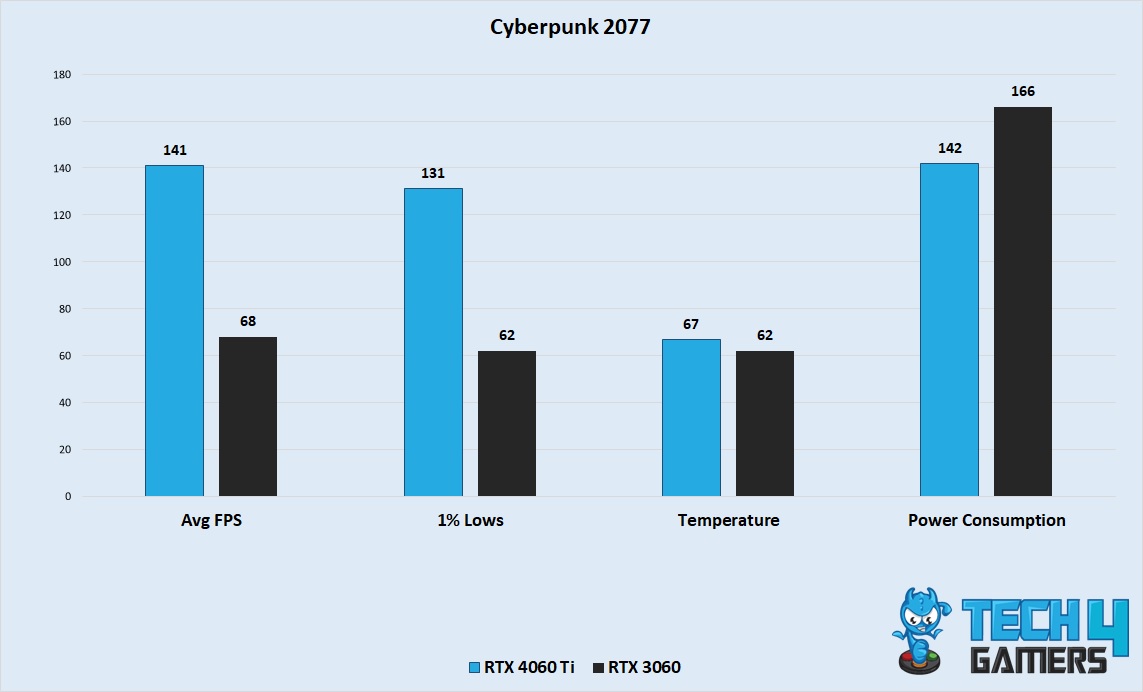
- In the first game of our benchmark tests with ray tracing, the RTX 4060 Ti gave us an impressive average of 141 FPS with the help of DLSS 3, whereas the use of DLSS 2 allowed the RTX 3060 to achieve an average of 68 FPS.
- These GPUs faired well regarding 1% lows, as they did not deviate substantially from their average FPS. The RTX 4060 Ti had 1% lows of 131 FPS, whereas the RTX 3060 had 1% lows of about 62 FPS.
Spiderman Miles Morales (DLSS 2/3, RT On)
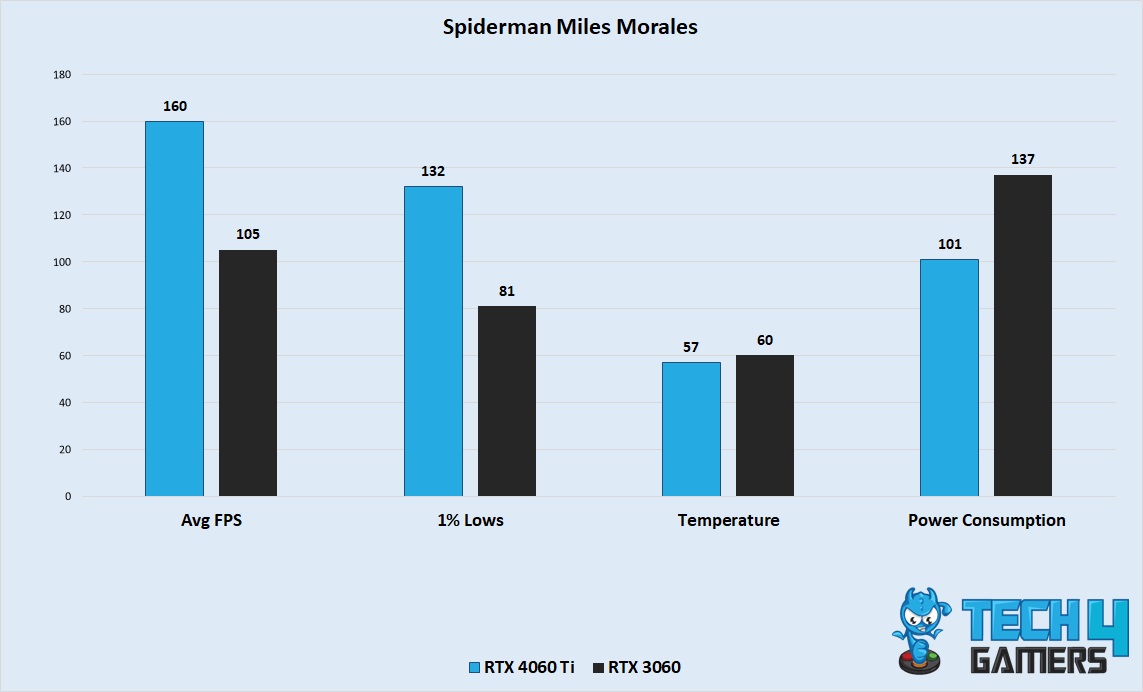
- In our benchmark tests for Spider-Man: Miles Morales with DLSS 2 and RT enabled, the RTX 4060 Ti achieved an average of 160 FPS with the support of DLSS 3. On the other hand, the RTX 3060, utilizing DLSS 2, achieved an average of 105 FPS.
- The RTX 4060 Ti delivered 1% lows of 132 FPS, while the RTX 3060 maintained 1% lows of around 81 FPS.
Call Of Duty Modern Warfare 2 (DLSS 2)
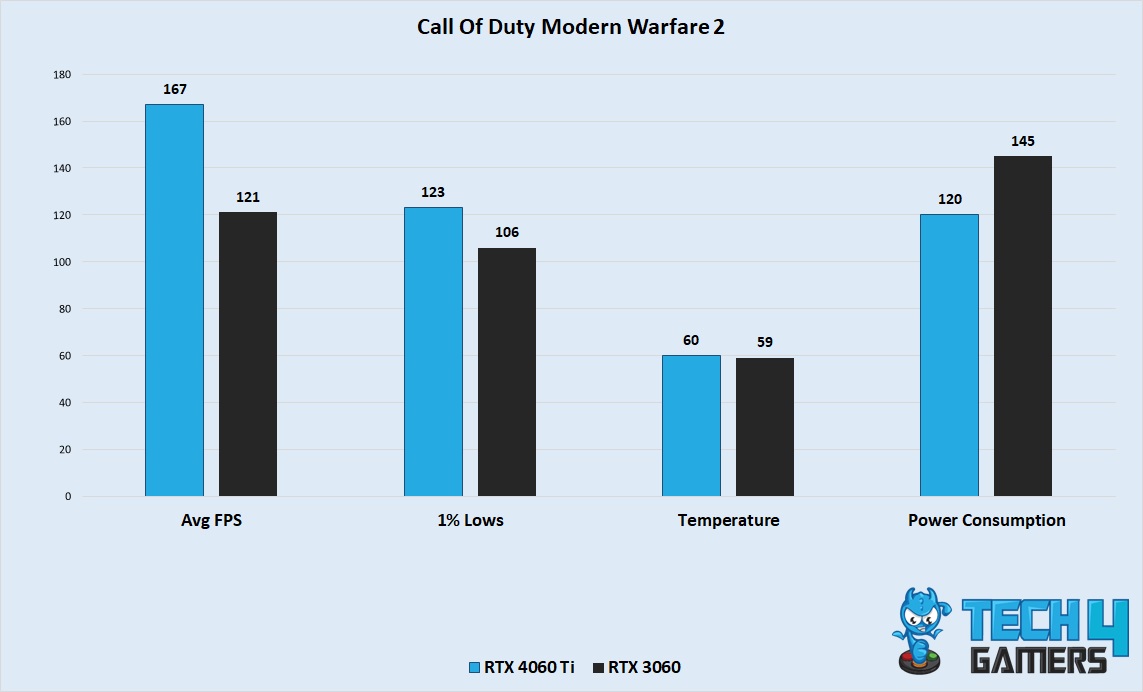
- In our Call of Duty Modern Warfare 2 test with DLSS 2, the RTX 4060 Ti demonstrated impressive performance, achieving an average of 167 FPS. On the other hand, the RTX 3060 delivered a respectable average of 121 FPS.
- The RTX 4060 Ti recorded 1% lows of 123 FPS, while the RTX 3060 maintained 1% lows of around 106 FPS.
Assassin’s Creed Valhalla (Native)
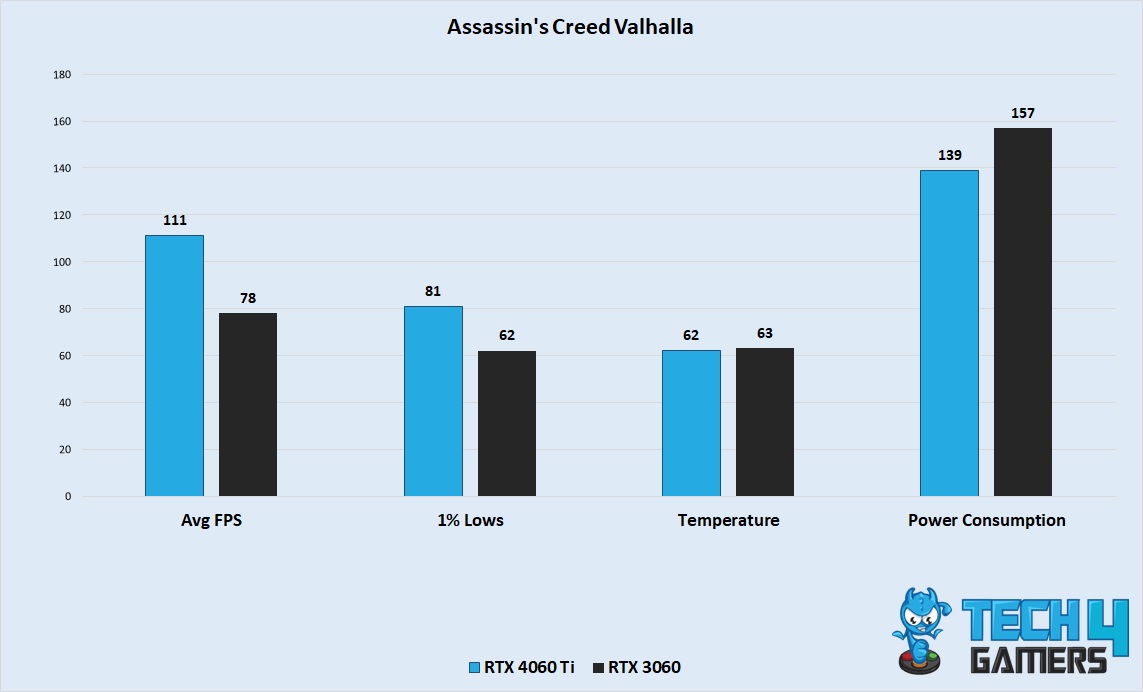
- When we fired up Assassin’s Creed Valhalla with no upscaling, the RTX 4060 Ti showcased impressive performance, achieving an average FP of 111 FPS. On the other hand, the RTX 3060 delivered a respectable average FP of 78 FPS, offering a solid performance but with a noticeable difference compared to the higher-end RTX 4060 Ti.
- Both GPUs maintained decent 1% lows. The RTX 4060 Ti recorded 1% lows of 81 FPS, while the RTX 3060 maintained 1% lows of around 62 FPS. Both of the cards delivered a 60 FPS experience in this game, at the least signifying smooth performance. This is a relief as this title has generally been regarded as unoptimized and hard to run.
Shadow Of The Tomb Raider (DLSS 2, RT On)
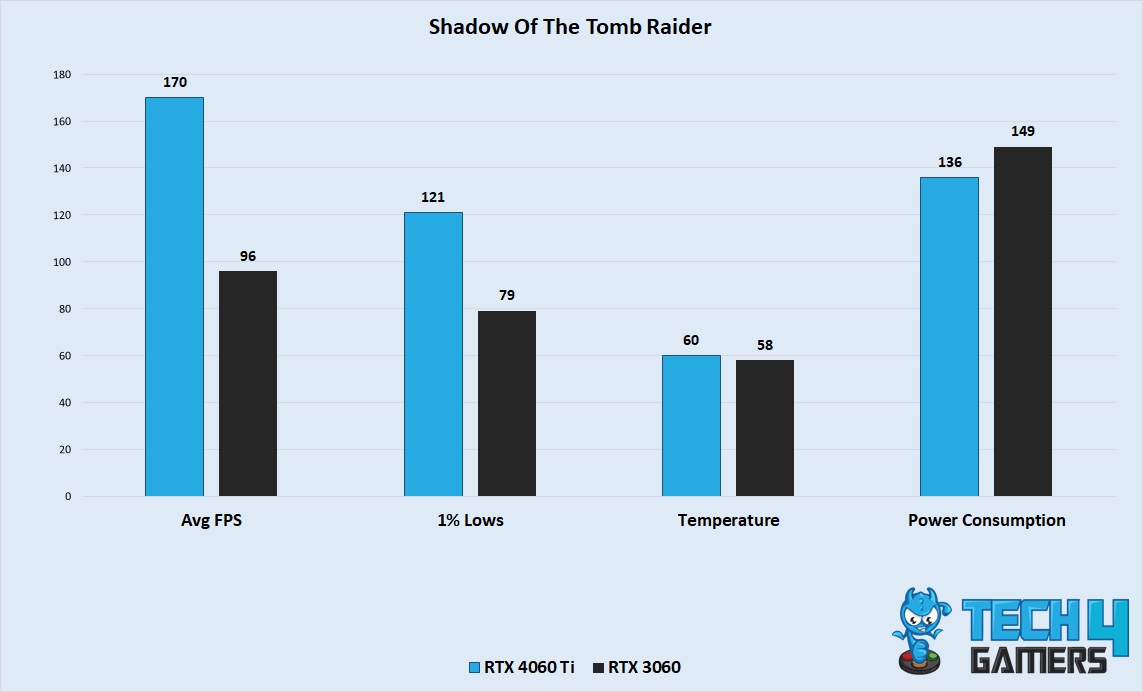
- Checking out the ray tracing performance in Shadow Of The Tomb Raider, the RTX 4060 Ti delivered exceptional performance, providing an impressive average of 170 FPS. On the other hand, the RTX 3060 performed well with an average frame rate of 121 FPS.
- Both GPUs maintained great 1% lows. The RTX 4060 Ti recorded 1% lows of 151 FPS, while the RTX 3060 maintained 1% lows of around 98 FPS.
Red Dead Redemption 2 (DLSS 2)
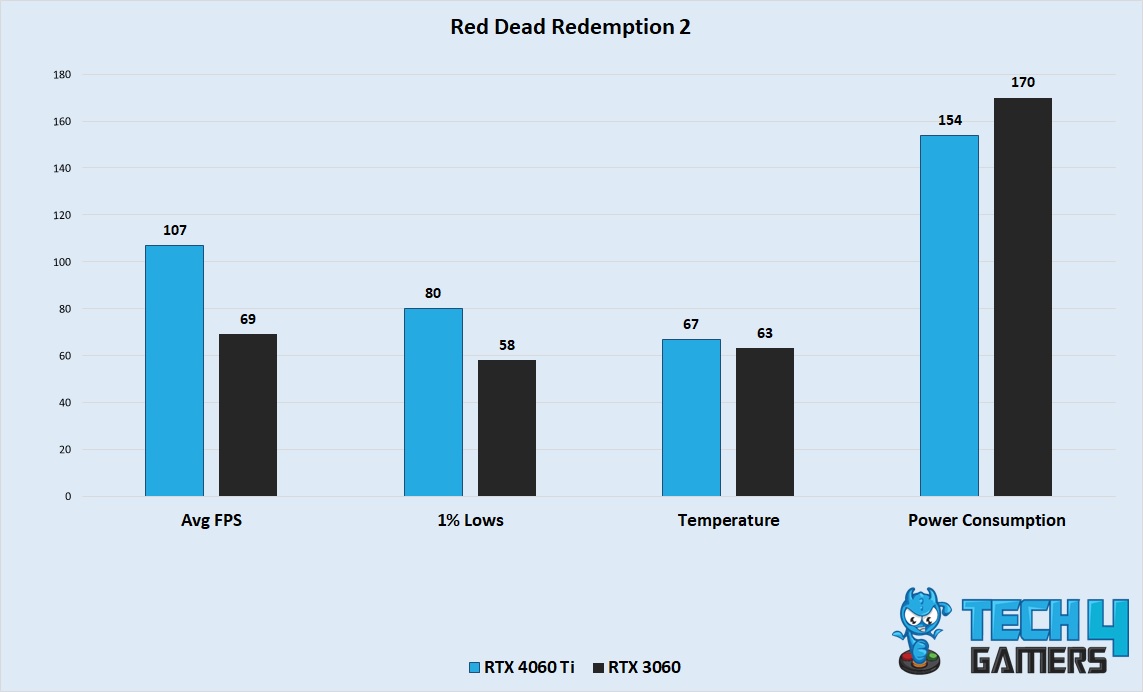
- In Red Dead Redemption 2 with DLSS 2, the RTX 4060 Ti delivered an impressive performance, achieving an average FP of 107 FPS. On the other hand, the RTX 3060 performed well with an average of 69 FPS, although it fell behind the higher-tier RTX 4060 Ti in terms of raw performance.
- The RTX 4060 Ti recorded 1% lows of 80 FPS, while the RTX 3060 maintained 1% lows of around 58 FPS.
Far Cry 6 (Native, RT On)
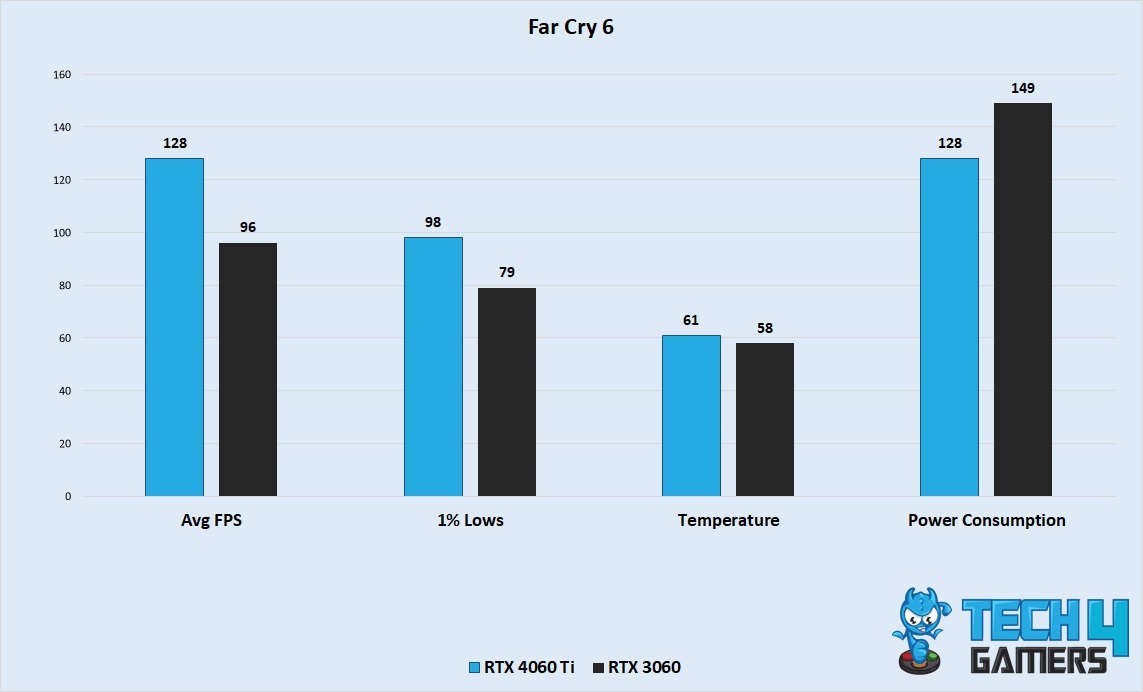
- When we tried out ray tracing while playing Far Cry 6, the RTX 4060 Ti showcased impressive performance, delivering an average of 128 FPS. This allowed for a visually stunning, immersive gameplay experience with realistic lighting and reflections. On the other hand, the RTX 3060 performed well, with an average of 96 FPS.
- Both GPUs maintained respectable 1% lows, with the RTX 4060 Ti recording 1% lows of 98 FPS, while the RTX 3060 maintained 1% lows of around 79 FPS.
Horizon Zero Dawn (DLSS 2, RT On)
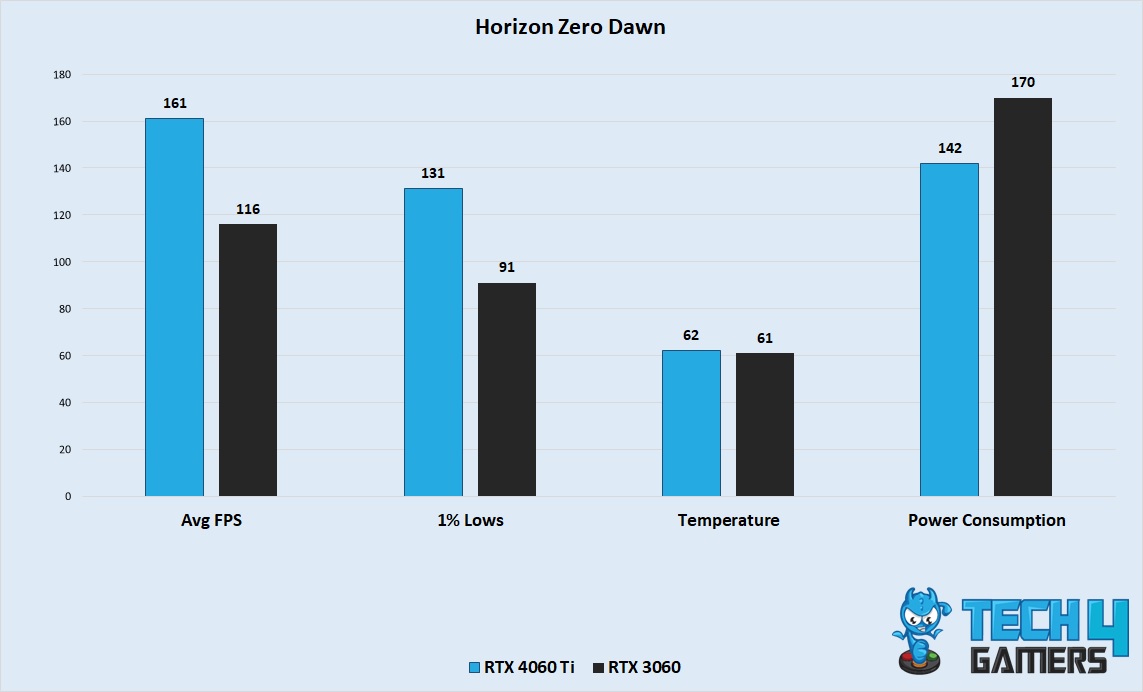
- Turning on RT in our test of Horizon Zero Dawn, the RTX 4060 Ti delivered an impressive performance, achieving an average FP of 161 FPS. On the other hand, the RTX 3060 performed well with an average of 116 FPS, although it fell slightly behind the higher-tier RTX 4060 Ti in terms of raw performance.
- Both GPUs maintained smooth 1% lows, indicating minimal frame rate drops during gameplay. The RTX 4060 Ti recorded 1% lows of 131 FPS, while the RTX 3060 maintained 1% lows of around 91 FPS.
RTX 3060 Vs RTX 4060 Ti: Overall Gaming Performance
In this section of the RTX 4060 Ti vs RTX 3060 comparison, we will look over the findings of our benchmark test in terms of average framerate, 1% lows, power, and temperatures.
Framerate
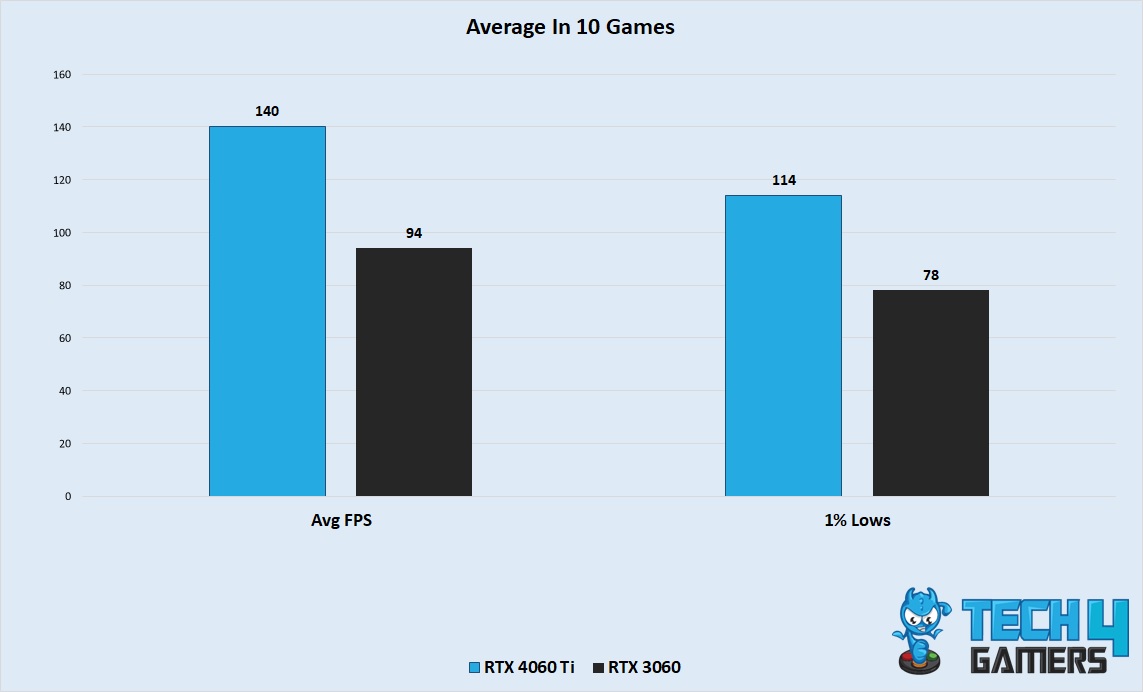
According to our tests, including some games that were not mentioned in the prior section, the RTX 4060 Ti averaged 140 FPS across the 10 games we ran, whereas the RTX 3060 came in with an impressive, yet much lower, average of 94 FPS. The advantage of the 4060 Ti was quite staggering.
The RTX 4060 Ti had 1% lows of about 114 FPS, whereas the RTX 3060 maintained 1% lows of about 78 FPS. Neither of these cards felt stuttering while we were using them, but the difference in smoothness was quite drastic.
Power Consumption
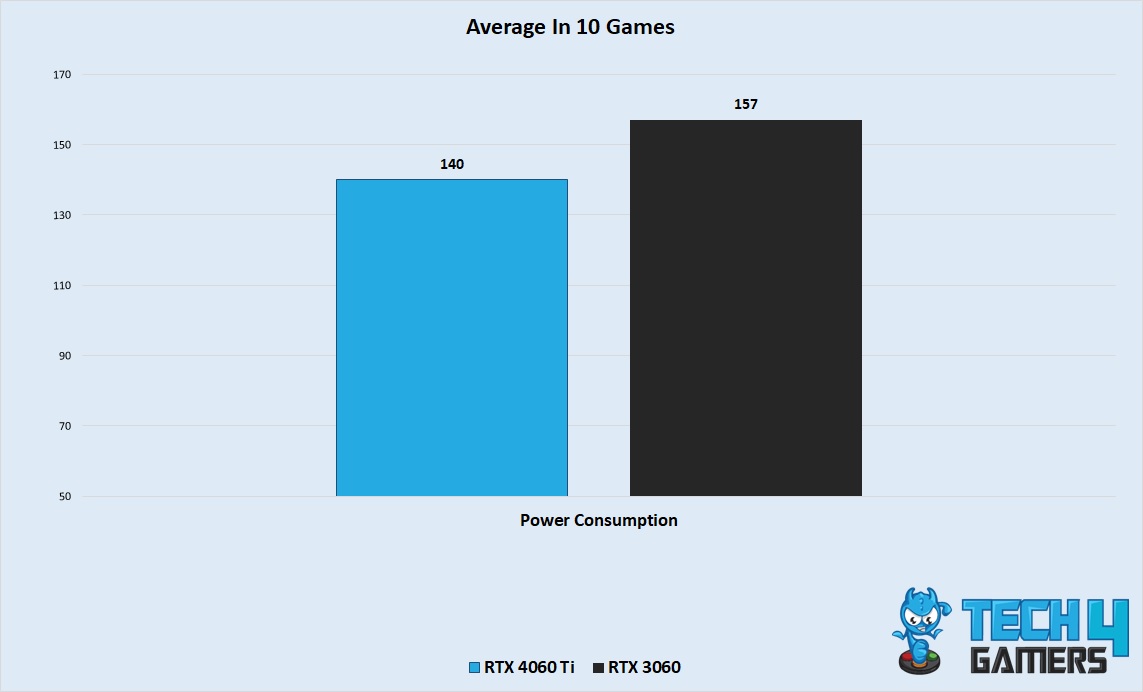
In our tests, the RTX 4060 Ti had an average peak power draw of about 140 Watts, whereas the RTX 3060 Ti drew 157 Watts on average.
The power draw of the RTX 4060 Ti is particularly significant as it is a higher tier and higher performing card than the RTX 3060, yet it manages to consume less power. The RTX 4060 Ti had a performance per watt of about 1 frame/watt, taking into account the data from our framerate testing, whereas the RTX 3060 was significantly behind with a performance of about 0.6 frames/watt.
Temperatures
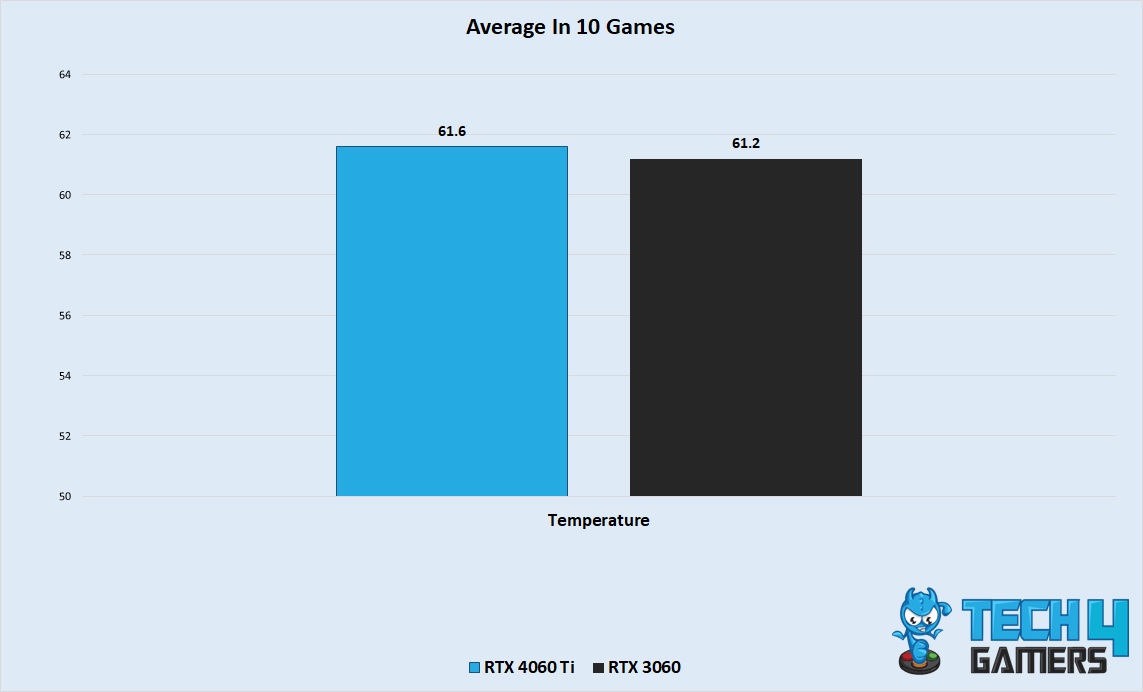
Our tests had the RTX 4060 Ti averaging peak temperature of 61.6°C, whereas the RTX 3060 had an average peak temperature of 61.2°C. As evident from the numbers, these temperatures were nearly the same between the two.
Temperatures are highly subject to multiple factors, like the fan on your card, the airflow in your PC, and the temperature of your room, so your results might look different from ours.
Price And Availability
- RTX 4060 Ti (8 GB variant) has an MSRP of $399.
- RTX 3060 launched with an MSRP of $329.
However, it’s worth noting that purchasing the RTX 3060 Ti at its launch MSRP this late in its lifecycle may not be the best investment. Instead, you can consider buying a used card from platforms like eBay, where prices can range from $150 to $220.
Both cards should be available in major retailers like Microcenter, as well as online retail websites like Amazon or Alibaba. Availability may vary depending on your location and market demand.
RTX 4060 Ti Vs RTX 3060: What We Recommend
The RTX 4060 Ti is designed for avid gamers who want exceptional performance, especially at 1080p gaming with frame generation enabled. It’s a high-performing choice for those seeking top-tier graphics capabilities.
In contrast, the RTX 3060 offers approximately two-thirds of the performance of the RTX 4060 Ti but at a more budget-friendly price. It’s a suitable choice for gamers who are cost-conscious but still desire excellent performance and features like ray tracing and DLSS.
While the RTX 4060 Ti targets gamers looking for the best performance, the RTX 3060 is a previous-generation card that remains a strong contender, offering solid gaming performance and advanced features.
Pros And Cons
| RTX 4060 Ti | RTX 3060 | ||
| Pros | Cons | Pros | Cons |
| It has frame generation technology. | The lower amount of VRAM can cause longevity issues. | Offers excellent performance for its price. | Not suitable for resolutions higher than 1080p. |
| It draws less power than the RTX 3060. | The price is steep for an entry-level card. | The larger amount of VRAM helps with longevity and performance. | It consumes more power than recent mid-tier cards. |
FAQs
The RTX 4060 Ti can play games with ray-tracing with the help of its newer RT core, while the RTX 3060 struggles to use ray-tracing.
The RTX 4060 Ti comes in 8 and 16 GB variants.
No, DLSS 3 and the accompanying frame generation are locked to the RTX 40 series of cards.
More From RTX 3060
More From RTX 4060 Ti
Thank you! Please share your positive feedback. 🔋
How could we improve this post? Please Help us. 😔
[Comparisons Expert]
Shehryar Khan, a seasoned PC hardware expert, brings over three years of extensive experience and a deep passion for the world of technology. With a love for building PCs and a genuine enthusiasm for exploring the latest advancements in components, his expertise shines through his work and dedication towards this field. Currently, Shehryar is rocking a custom loop setup for his built.
Get In Touch: shehryar@tech4gamers.com


 Threads
Threads